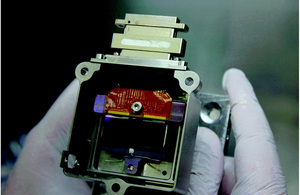Implants that push into the surface of the brain to gain electrical access to neurons have to be connected to the outside world somehow. Thin umbilical cables to the scull tend to be the answer. These cables need to be very flexible as the brain is fixed within the skull, but rather ‘floats’ in liquid (cerebrospinal fluid – ‘CSF’) within ...
Research
The latest electronics research news from within the industry and universities from around the world.
UK funds science projects for Moon, Mars and Venus
The UK is funding scientists and engineers to work on a series of international space science and exploration projects involving the Moon, Mars and Venus. The UK Space Agency (UKSA) has announced the allocation of £7 million under the Space Science and Exploration Bilateral Programme. The seven projects involve the universities of Aberdeen, Cambridge, Leicester (twice), Royal Holloway, Sussex and ...
Why new blue OLEDs die young
Next-generation blue OLED materials degrade early mainly due to the loss of oxygen in molecules at the interface between emission and electron transport layers, according to the UK’s National Physical Laboratory, which teamed up with the Samsung Advanced Institute of Technology to pull OLED junctions apart in minute detail. “The presence of these degradation molecules correlates negatively with the blue ...
EW BrightSparks 2023: Sam Jones, Lancaster University
Now in its sixth year of awards, EW BrightSparks sees Electronics Weekly highlight and celebrate some of the brightest and most talented young engineers in the UK today. Here, in our series on the latest EW BrightSparks of 2023, we highlight Sam Jones, a PhD student at Lancaster University. Achievements Sam is an EPSRC-ICASE PhD student in the Physics Department ...
£11m each for Bristol and Southampton universities
Bristol and Southampton universities have received £11m each in government funding for research into semiconductor technologies under the government’s £1 billion support scheme for the UK semiconductor industry. Southampton will focus on silicon photonics. The support will “unite leading UK entrepreneurs and researchers, together with a network of support to improve the commercialisation of semiconductors and deliver a step-change in ...
UK Space Agency joins EISCAT international space observatory
The UK Space Agency (UKSA) has signed an agreement to join EISCAT, the international space observatory. And it has also announced £5.5 million financial backing for Arctic research. EISCAT operates four radar sites across Norway, Sweden and Finland, and it studies the ionosphere, the outermost layer of Earth’s atmosphere which forms the boundary with outer space. It is also the ...
NQCC to get QuEra neutral atom quantum computer
QuEra Computing is to provide the UK’s National Quantum Computing Centre (NQCC) with an error-corrected neutral atom quantum computer as part of NQCC’s £30m programme to gather six different prototype quantum computers. It is expected to be operating early in 2025. In this case, the neutral atoms are rubidium, manipulated by laser optical tweezers and also operated by laser – ...
£30m for prototypes at the UK National Quantum Computing Centre
Quantum Motion is to build a quantum processor test bed for the UK’s National Quantum Computing Centre (NQCC) at the Rutherford Appleton Laboratory in Oxfordshire. The prototype system “will be based on the same silicon MOS platform used throughout the consumer electronics industry today, while the test bed forms part of NQCC’s vision to enable the UK to solve some ...
Musk’s brain interface implanted in a human
“The first human received an implant from Neuralink yesterday and is recovering well,” tweeted Elon Musk yesterday. “Initial results show promising neuron spike detection.” Neuralink is Musk’s electronic brain interface company, developing implants with connections to thousands of in-brain electrodes. Its goal, the company has said, is to enable people with paralysis to “directly use their neural activity to operate ...
Winner – Lancaster University Readers’ Choice Award : University Research Project of the Year
Lancaster University is creating a spinout company to develop a universal memory called ULTRARAM. Invented by physics professor Manus Hayne, who collected the award, ULTRARAM combines the non-volatility of a data storage memory, such as flash, with the speed, energy-efficiency and endurance of a working memory, such as DRAM. Shortlist * University of Birmingham – Liquid gallium alloy micro-fluidic mm-Wave ...
 Electronics Weekly Electronics Design & Components Tech News
Electronics Weekly Electronics Design & Components Tech News



